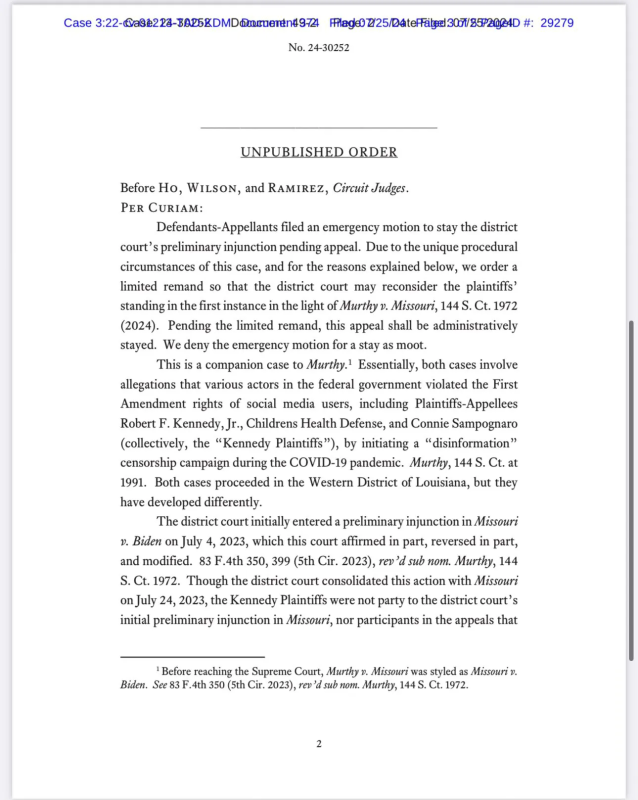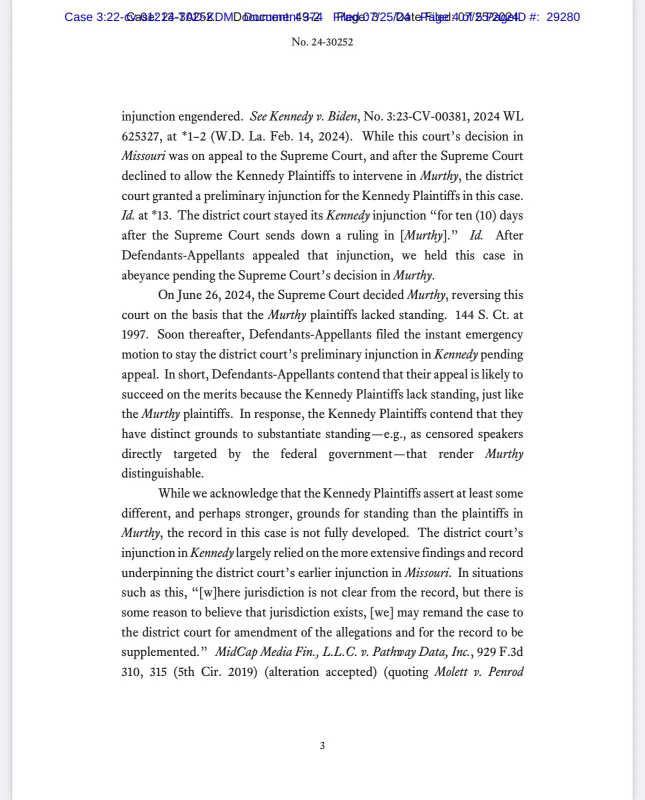As I explained in previous posts, back in 2023 the District Court combined (enjoined) our Missouri v. Biden case against government censorship with a similar case, Kennedy v. Biden, filed in the same court by plaintiffs Robert F. Kennedy, Jr, Children’s Health Defense (Kennedy’s nonprofit advocacy group), and Connie Sampognaro. This means Kennedy and his co-plaintiffs can utilize all our case’s documents on discovery; and for our purposes, he is considered, as it were, a co-plaintiff.
However, the combining of our cases occurred after the Supreme Court had agreed to hear the appeal on our injunction, and SCOTUS denied Kennedy’s request to be part of that appeal. So he was not considered among the plaintiffs when SCOTUS dismissed the injunction on grounds of standing.
In the meantime, the District Court issued a similar injunction against the government on behalf of Kennedy’s case but stayed that injunction until 10 days after the Supreme Court ruled in our case. As that time period recently expired, predictably, the government again appealed Kennedy’s injunction to the 5th Circuit. Importantly, we believe that Kennedy will be able to pass the ridiculously high bar for standing that the Supreme Court demanded in our case.
In documents we’ve obtained on discovery, Kennedy was named several times, and specifically identified posts of his were targeted for censorship by government officials. If he does not have standing to bring the case then nobody does, and government censorship can proceed without any citizens having any legal recourse.
In the latest development, the 5th Circuit Court of Appeals recently responded to the government’s request for a stay on Kennedy’s injunction. The appeals court remanded the question back to the District Court with instructions to consider whether Kennedy met this high-standing bar set by SCOTUS. Importantly, the 5th Circuit’s order also suggested that Kennedy plaintiffs may hit the stringent SCOTUS definition for standing on this issue (see below for the text of the Court’s order). The Court acknowledged important factual differences in Kennedy’s case that may be relevant for questions about standing.
And importantly, if only one plaintiff among all of us in the combined cases establishes standing, the combined cases move forward and the court will have to consider the injunction request on the merits: the Supreme Court will eventually have to look at the evidentiary record.
Hopefully, I’ve explained these Byzantine legal developments sufficiently for you to follow, but in the event that you’re still wondering what all this means, here’s my prediction: the District Court will issue the injunction on behalf of Kennedy with an argument that he does meet SCOTUS’s stringent standing requirements; the 5th Circuit will uphold this injunction on appeal; then we’ll be back at the Supreme Court next year on the injunction issue.
SCOTUS will agree that, according to their own criteria, Kennedy has standing and the Supreme Court will have to consider the evidentiary record and make a ruling on the merits. At that point, I don’t see how they can avoid giving us a favorable ruling, likely to be issued next June. Better late than never.
Finally, keep in mind that all this is only in regards to the preliminary injunction and based on limited discovery in the combined cases so far—it’s not applicable to the entire case. The rest of our Missouri v. Biden case is, in the meantime, moving forward with additional discovery at the District Court as we enter the trial phase. As always, stay tuned for updates.




Republished from the author’s Substack
Join the conversation:


Published under a Creative Commons Attribution 4.0 International License
For reprints, please set the canonical link back to the original Brownstone Institute Article and Author.









